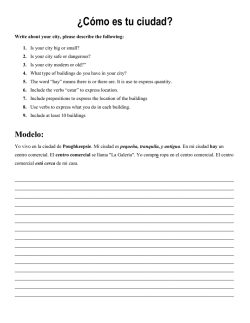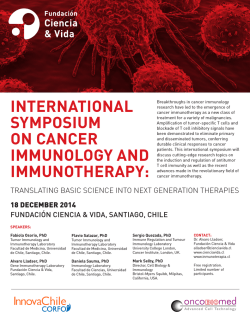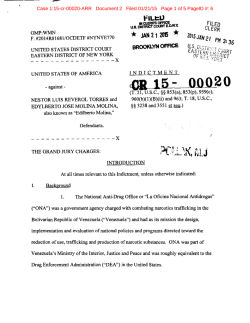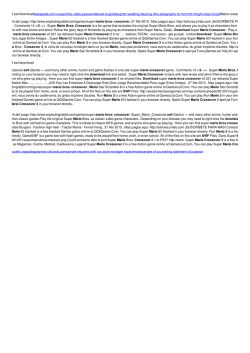
t - IPSUSS
Air Pollution, Transport and Health Effects Project funded by CONICYT/Fondo Nacional de Desarrollo Científico y Tecnológico (FONDECYT), Project Nº1131085 Claudia Blanco Docente Investigadora– Universidad San Sebastian March 18, 2015 Project Researchers • Dr. Sabit Cakmak, Health Ministry, Canada • Dr. Oscar Cristi, Universidad San Sebastián • Dr. Juan Pablo Couyoumdjian, Universidad del Desarrollo • MA Claudia Blanco, Universidad San Sebastián Overview • • • • • Background Description of the project Methodology Transport, air quality and health data Discussion Overview • • • • • Background Description of the project Methodology Transport, air quality and health data Discussion Evolution of Santiago’s transport system Pre 1980 • State system • Regulation of tariffs, routes and frequencies • State involvement in the operation Between 1991 and 2003 • Regulated market • Multiple tenders of routes • Regulated area: interior of Vespucio ring • Fleet renovation • Tariff fixed in the tender process Between 1980 and 1990 • Free market • Better frequencies and coverage • Steep tariff increase • Uncontrolled increase of the fleet • Congestion and pollution Year 2004 • Regulated by Ministerial Resolution (the majority) and tender (Metrobus) • More than 3000 bus owners grouped in 120 organizations • Regulated area: all Gran Santiago • 323 transport services • 7000 buses Pollution reduction objectives • The Atmospheric Pollution Reduction and Prevention Plan for Santiago (PPDA) established the PM10 and NOx emissions reduction goals for public transport • New emissions standard for new buses (Euro III, october 2000) • Modification of opacity standard for Euro I and Euro II buses (30 % reduction). • Filters implementation for Euro III buses Monday 17/7/06 – Alameda Street Source: Estudios Transantiago - Centro Mario Molina, Chile Source: Estudios Transantiago - Centro Mario Molina, Chile Source: Estudios Transantiago - Centro Mario Molina, Chile Source: Estudios Transantiago - Centro Mario Molina, Chile Source: Estudios Transantiago - Centro Mario Molina, Chile Source: Estudios Transantiago - Centro Mario Molina, Chile Source: Estudios Transantiago - Centro Mario Molina, Chile Source: Estudios Transantiago - Centro Mario Molina, Chile Source: Estudios Transantiago - Centro Mario Molina, Chile Source: Estudios Transantiago - Centro Mario Molina, Chile Source: Estudios Transantiago - Centro Mario Molina, Chile Source: Estudios Transantiago - Centro Mario Molina, Chile Source: Estudios Transantiago - Centro Mario Molina, Chile Why to study filters’ implementation? Overview • • • • • Background Description of the project Methodology Transport, air quality and health data Discussion Objectives • To contribute towards understanding transportation effects on air quality • To contribute towards understanding transportation effects on population health Exhaust emissions and health Carbon Monoxide (CO) Results from incomplete combustion of fuel. CO reduces the ability of blood to carry oxygen and can cause headaches, respiratory problems and, at high concentrations, even death. Oxides of Nitrogen (NO x) Produced in any combustion process, NOx emissions are oxidised in the atmosphere and contribute to acid rain. They also react with hydrocarbons to produce photochemical oxidants, which can harm plants and animals. Sulphur Dioxide (SO2) Sulphur occurs naturally in the crude oil from which petrol and diesel are refined. It forms acids on combustion leading to acid rain and engine corrosion. It also contributes to the formation of ozone and of particulate matter. Sulphur can also adversely affect the performance of catalytic converters. Hydrocarbons (HC) HCs are emitted from vehicle exhausts as unburnt fuel and also through evaporation from the fuel tank, from the nozzle when you fill up and also at stages through the fuel supply chain. They react with NOx in sunlight to produce photochemical oxidants (including ozone), which irritate the eyes and throat. Exhaust emissions and health Benzene (C6H6) Naturally occurring in small quantities (less than 2%) in petrol and diesel, Benzene is emitted from vehicle exhausts as unburnt fuel and also through evaporation from the fuel system. Benzene is toxic and carcinogenic. Long-term exposure has been linked with leukaemia. Lead (Pb) Lead accumulates in body systems and is known to interfere with the normal production of red blood cells. Following the introduction of unleaded petrol and withdrawal of leaded petrol lead is essentially eliminated as an exhaust product. Particulates (PM) Particulate matter is partly burned fuel associated mainly with diesel engines. PM10s are very small particles that can pass deep into the lungs causing respiratory complaints. Hypothesis The main hypothesis is that the implementation of post combustion filters or a better technology improves significantly air quality resulting in a positive impact on public health. Specific Goals • To generate new data not available until today in Chile that could help to test the main hypothesis. • To estimate the impact of several pollutants on a multivariate analysis that allows isolating the health effect resulting of the air filters ́ implementation. • To study the impact of implementing post combustion filters on both mortality and morbidity for the Metropolitan Region of Santiago. Overview • • • • • Background Description of the project Methodology Transport, air quality and health data Discussion Methodology • Population health and air quality log E(yij (t)) f1ij (t; ) f2ij (w(t); ) ij xij(t) + δij zij(t) yij (t) medical visits or mortality for day t, at location i in year j xij (t) air quality for day t, at location i in year j zij (t) public transport for day t, at location i in year j Methodology Transportation emissions Overview • • • • • Background Description of the project Methodology Transport, air quality and health data Discussion Data Population Daily number of deaths and illness in Metropolitan Santiago: oall non-accidental (ICD10<V*) ocardiovascular (ICD-10 codes I00-I99) oand respiratory (ICD-10 codes J00-J98) Data Traffic variables o average speed and buses flow information calculated from traffic flow delivered, considering rush and non-rush hours o the estimates emissions from public transport road traffic come from an emission factor with available information on bus mileage o bus fleet composition by business unit o activity level expansion factor by service. Data Air Pollution Data o Ambient levels of hourly fine and coarse particulate matter (PM2.5 and PM10), nitrogen dioxide (NO2), ozone (O3) and sulfur dioxide (SO2). o Locations represent areas of high population density, variety of land-use, and high traffic areas. Overview • • • • • Background Description of the project Methodology Transport, air quality and health data Discussion Discussion • This project could help assess if transport is appropriately targeted for reduction. For example, particulate matter is comprised of several physical and chemical characteristics with varying toxicity. • Mitigation strategies that target a single or a limited number of pollutants may not yield expected proportionate improvements in population health if those mass reductions do not coincide with reductions in the most toxic components of particle phase pollution. Thank you
© Copyright 2026




